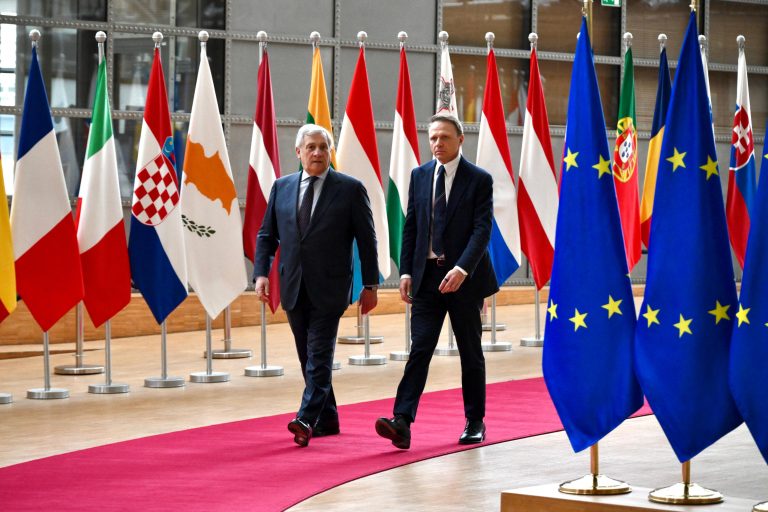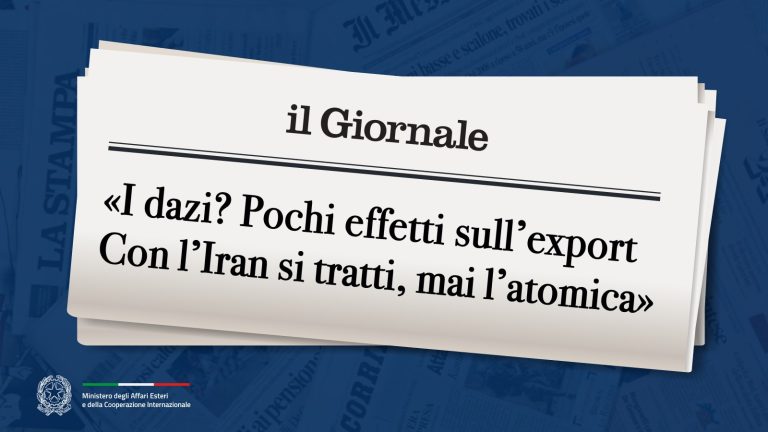“The minimum wage risks pushing salaries down. We must instead cut the tax burden on the additional items of wages: we want to give concrete things to workers,” explains Italian Deputy Prime Minister and Minister of Foreign Affairs Antonio Tajani, announcing an Italian government measure to that effect in the near future. After that, however, it will be the turn of a justice reform and a tax reform, “To allow companies to work better and more, thus paying their employees better,” reiterates the Minister, who is in Salerno to attend the ceremony for the naming of a tower of the judicial citadel after Diego Tajani, his great-uncle. In the afternoon, he will be in Giffoni for the Film Festival.
Your ancestor was Minister of Justice, a famous lawyer, but above all one of the first to point the finger at Mafia collusion with politics.
“He was my great-grandfather’s brother and he openly denounced the Mafia phenomenon and its links with white-collar criminals. One of his speeches in Parliament became famous: it was 1875, fourteen years after the unification of Italy.”
Yet, in recent weeks there has been controversy because the Italian government wanted to change the crime of external association.
“My colleague Nordio has been misquoted. He never said that the abolition of external association should be included in the government’s programme; he said something different, which points to a harder fight against the mafia: making sure that there is no evanescent rule, but that the type of crime is clearly defined in the code. The fight against the mafia will never be dropped. As President Mattarella says, we must fight precisely those grey areas that are the breeding ground of the clans.”
Patrick Zaki has just been released. However, some speculate that there may have been a “barter” with the Regeni case.
“There was no bartering, no back-room deals. On the contrary, the Italian government has succeeded with great effort in securing the return to Italy of a young researcher who was in danger of being imprisoned. Say what you will, but we are serious people and we do not engage in bartering of this kind. On the contrary, we will continue to demand that light be shed on the Giulio Regeni affair as we have always done. I myself have been to Egypt twice in recent months, and I have had assurances from El-Sisi on both issues. To speak of swaps or anything of the like would be sheer madness: we have continued to keep the attention high on this case and on that of Regeni, showing that we are also resolving more delicate issues such as that of Alessia Piperno, unjustly detained in Iran by the Pasdaran. We worked diplomatically and without clamour, starting with the Prime Minister during the November summit in Sharm El Sheikh, and we brought an important result home. I say we rejoice at this and avoid controversy.”
The EU Foreign Affairs Council has met in Brussels: the war on Ukraine remains at the top of the list, but do we have to worry about Russia’s grain blockade?
“The issue of wheat is crucial, because it will lead to an increase in prices. It is not a problem for Italy or Europe, but it risks becoming a tragedy for African countries in the coming months. Together with our European partners, we will continue to work so that the supply corridor through Romania can continue to operate. For us, the two key points at the moment are the security of the Zaporizhzhia power plant and the security of grain transport to the African peoples. The latter will be the focus of the FAO World Summit on Food Security in Rome next week.”
What is the state of health of the Italian government? In these weeks, in particular, the affair of Ms Santanchè has been a hot topic.
“Apart from a few legal issues, which will have their natural course in the appropriate fora, the government is in excellent health. We are moving forward by bringing home concrete results beyond what the opposition propaganda says. I understand what they are doing but the results are tangible.”
A heated autumn could be on the horizon: the centre-left coalition and CGIL are ready to take to the streets for the minimum wage.
“Workers deserve a rich wage, not a minimum wage, as the opposition demands.”
Many European countries have adopted it.
“The EU says that with collective bargaining above 80 per cent, there is no need for a minimum wage, which is in fact poor. And this is precisely the case in our country, where we could risk the paradox of lowering the wage of metalworkers, who already earn more than EUR 9 per hour at the beginning of their working career. The minimum wage exists in countries such as Germany, where, however, there is no collective bargaining except within the Länder.”
What could be the solution?
“We need to lower the tax wedge and completely de-tax additional salary items starting with 13th-month bonuses. That is the solution; the minimum wage would risk exacerbating the problem instead of solving it. Instead, I am for giving a concrete perspective to working employees who are entitled to richer salaries. Alongside this, we need another great liberal revolution that may touch on justice and all fiscal and tax matters.”
How so?
“In Italy, we have about 100 taxes to pay, but only 16 of them really cash in, bringing 96 per cent of the revenue to the State: the rest is even complicated and expensive to collect. We need a reform in this field as we do in that of justice, starting with civil justice, whose delays cost us as much as 3 points of GDP. All this is to allow companies to live in a liberal system to work better and pay their employees better. To settle for the minimum wage, as the Left wants, would be madness.”
The problem is timing.
“The tax wedge could be lowered in a few months, putting more money in motion without damaging the State coffers. A first example of concrete help for companies has been put in place in the south of Italy, which, thanks to the current Italian government, is now a SEZ zone. To create the best conditions for development.”



